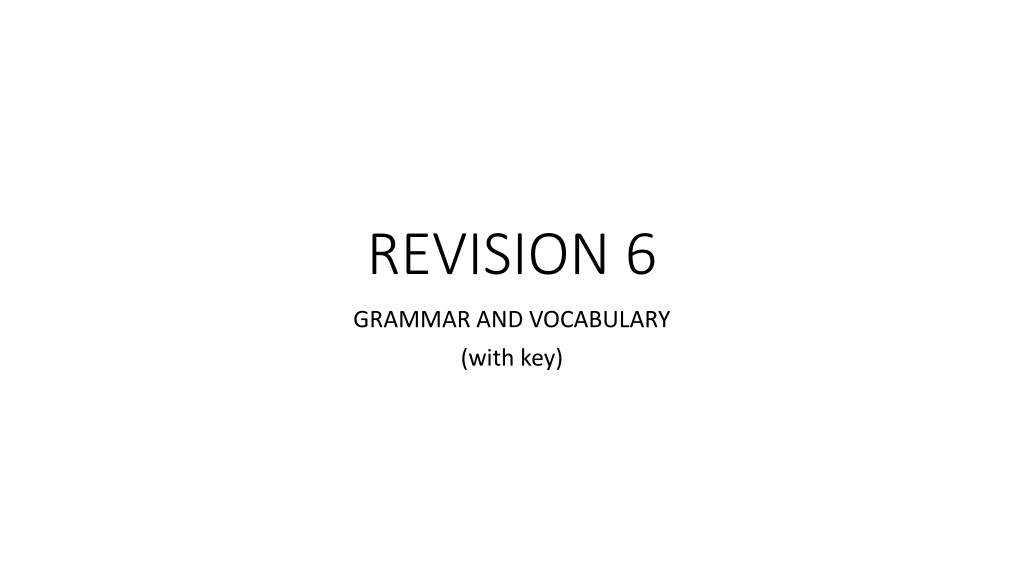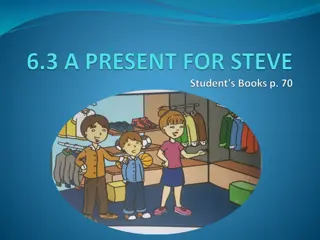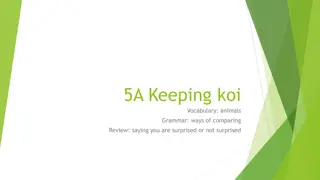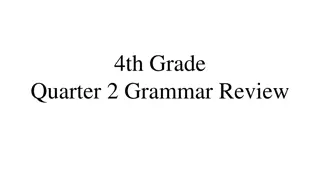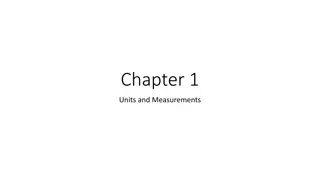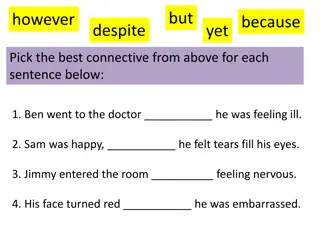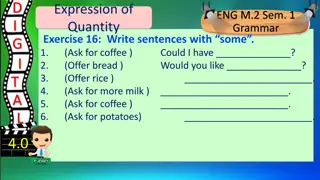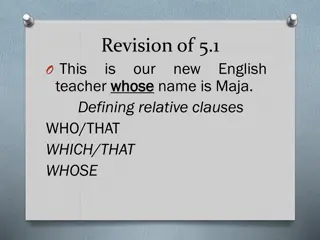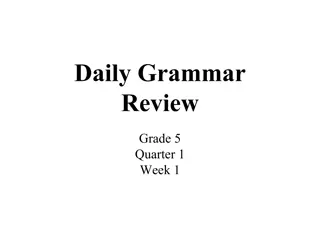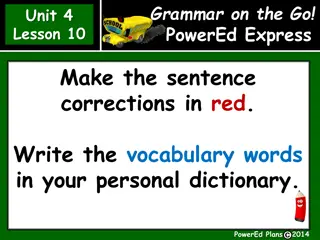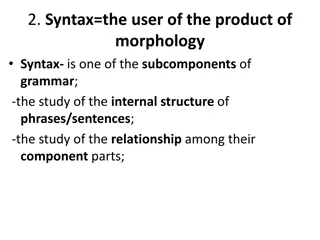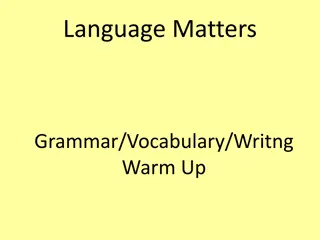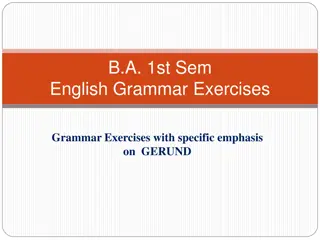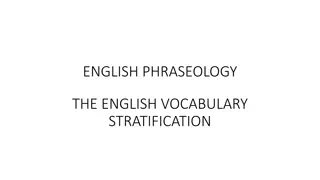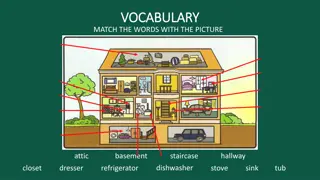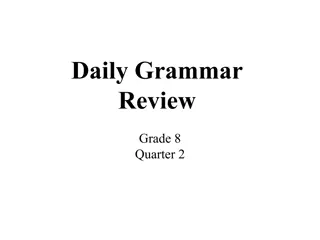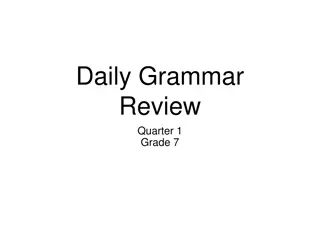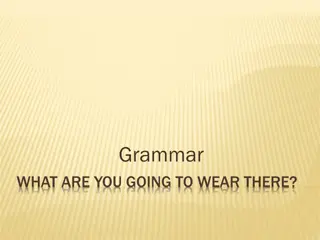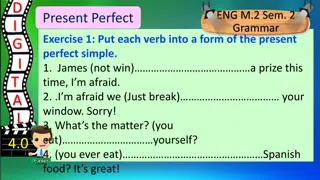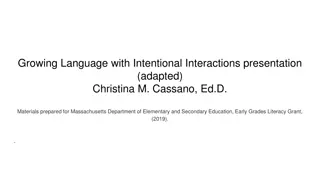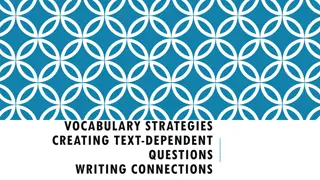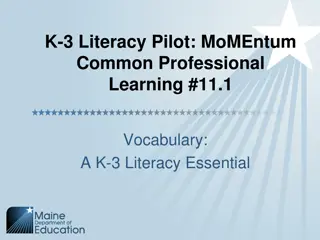Grammar and Vocabulary Review with Exercises for Units 11 and 12
This revision session covers grammar topics such as reported statements and questions from Units 11 and 12, along with vocabulary related to learners with low incidence, multiple, severe disabilities, and physical disabilities. Extra practice exercises are provided from an English language learning platform for further reinforcement.
Download Presentation

Please find below an Image/Link to download the presentation.
The content on the website is provided AS IS for your information and personal use only. It may not be sold, licensed, or shared on other websites without obtaining consent from the author. Download presentation by click this link. If you encounter any issues during the download, it is possible that the publisher has removed the file from their server.
E N D
Presentation Transcript
REVISION 6 GRAMMAR AND VOCABULARY (with key)
Revision 6 reviews grammar and vocabulary from Units 11 and 12. Unit 11: Grammar Reported statements (please refer to page 73 in your books) Vocabulary Learners with low incidence, multiple and severe disabilities (pages 70 and 71) Unit 12: Grammar Reported questions (please refer to page 77 in your books) Vocabulary Learners with physical disability (pages 74 and 75) EXTRA PRACTICE: Please create an account for the En-Abilities English language learning platform available at https://desarrollo.enabilities.prometeoinnovations.com/login/index.php Go to English course B1 Unit 8 Exercises 8.6, 8.7, 8.8, 8.9, 8.10
Exercise 1 REPORT THE FOLLOWING SENTENCES. 1. 2. 3. 4. 5. 6. 7. 8. 9. 10. 11. 12. 13. 14. I m living in London. We moved into our new house last month. Rachel and Mark are getting married next month. My sister has had a baby, I don t know what Frank is doing. I saw Helen at a party in June and she seemed fine. I haven t seen Diane recently. My car was stolen a few days ago. I want to go on holiday, but I can t afford it. I ll tell Chris I saw you. John cleared the garden yesterday. Mind your own business. Don t wait for me. Please slow down!
Exercise 2 CHANGE THE FOLLOWING QUESTIONS INTO INDIRECT SPEECH 1. I asked him _________________________________ Are you ready to hear the truth? 2. I had to know ________________________________ Are you going home now or are you going to stay a while more? 3. I wondered __________________________________ How many times has he made the same mistake? 4. He asked me _________________________________ What s the new city code? 5. She asked me _______________________________ When did you graduate from college? 6. She wanted to know ___________________________ Do you like to work in a team?
9. She asked me _______________________________ How much money did you earn at your last job? 10. The boss was curious to find out __________________ How often are you late for work? 11. He wanted to know ____________________________ When will the meeting start? 13. She kept asking ______________________________ Do you mind working at weekends? 14. She wanted to know ___________________________ What were you doing yesterday between 2 and 5? 15. She asked me to show her ______________________ How would you solve the problem? 16. She even asked me ___________________________ How long have you been seeing each other? 17. He asked his colleague _________________________ How can you be so rude to me?
Exercise 3 (page 78 in your books) Report the following sentences and questions 1. Deaf-blind students learn through direct teaching and structured routines. 2. What was the prevalence of low-incidence, multiple and severe disabilities 20 years ago? 3. Some people with TBI have recovered completely. 4. Is cerebral palsy a chronic disease? 5. He will start using adaptive devices next week. 6. What do many individuals with physical impairments use? 7. He had been diagnosed with TBI before he came to this school.
Exercise 4. Vocabulary Write the appropriate term or phrase for each definition A brain damage that results from open or closed head injury A significant impairment in both hearing and seeing Physical limitations or other health problems which affect a person s physical functioning, mobility, etc. A condition which exists for only a short time A condition which gradually develops over time A condition which is permanent A neurological condition characterized by paralysis, weakness, lack of coordination, and/or other motor dysfunction An episodic seizure disorder A hereditary disease characterized by progressive weakness caused by degeneration of muscle fibers A systemic disease affecting children s muscles and joints Adaptive devices used by people with physical disabilities
Exercise 1 REPORT THE FOLLOWING SENTENCES. 1. 2. 3. 4. 5. 6. 7. 8. 9. 10. She told me she would tell Chris she had seen me. 11. She said John had cleared the garden the day before. Remember: use an indirect object after TELL change the tense of the verb when the reporting verb (say/tell) is in the past change pronouns and expressions of time and place She said that she was living in London. They told us they had moved into their new house the month before. He said that Rachel and Mark were getting married the following month. She told us that her sister had had a baby. He said he didn t know what Frank was doing. She told me that she had seen Helen at a party in June and that she had seemed fine. He said he hadn t seen Diane recently. He told us that his car had been stolen a few days before. She said she wanted to go on holiday but she couldn t afford it.
12. They told us to mind our own business. 13. I told them not to wait form me. 14. I asked him to slow down. *Remember: We report the imperative with to-infinitive or not + to-infinitive (negative).
Exercise 2 CHANGE THE FOLLOWING SENTENCES INTO INDIRECT SPEECH 1. I asked him if he was ready to hear the truth. Are you ready to hear the truth? 2. I had to know if he was going home then or if he was going to stay a while more. Are you going home now or are you going to stay a while more? 3. I wondered how many times he had made the same mistake. How many times has he made the same mistake? 4. He asked me what the new city code was. What s the new city code? 5. She asked me when I had graduated from college. When did you graduate from college? 6. She wanted to know if I liked to work in a team. Do you like to work in a team?
9. She asked me how much money I had earned at my last job. How much money did you earn at your last job? 10. The boss was curious to find out how often I was late for work. How often are you late for work? 11. He wanted to know when the meeting would start. When will the meeting start? 13. She kept asking if I minded working at weekends. Do you mind working at weekends? 14. She wanted to know what I had been doing the day before between 2 and 5. What were you doing yesterday between 2 and 5? 15. She asked me to show her how I would solve the problem. How would you solve the problem? 16. She even asked me how long we had been seeing each other. How long have you been seeing each other? 17. He asked his colleague how he could be so rude to him. How can you be so rude to me?
Exercise 3 (page 78 in your books) Report the following sentences and questions 1. She said that deaf-blind students learnt through direct teaching and structured routines. 2. He wanted to know what the prevalence of low-incidence, multiple and severe disabilities had been 20 years before. 3. They told us that some people with TBI had recovered completely. 4. She asked me if cerebral palsy was a chronic disease. 5. She said he would start using adaptive devices the following week. 6. He wondered what many individuals with physical impairments used. 7. They told us that he had been diagnosed with TBI before he had come to this school.
Exercise 4. Vocabulary Write the appropriate term or phrase for each definition A brain damage that results from open or closed head injury traumatic brain injury (TBI) A significant impairment in both hearing and seeing deaf-blindness Physical limitations or other health problems which affect a person s physical functioning, mobility, etc. physical disability A condition which exists for only a short time transitory A condition which gradually develops over time progressive A condition which is permanent chronic A neurological condition characterized by paralysis, weakness, lack of coordination, and/or other motor dysfunction cerebral palsy An episodic seizure disorder epilepsy A hereditary disease characterized by progressive weakness caused by degeneration of muscle fibers muscular dystrophy A systemic disease affecting children s muscles and joints juvenile rheumatoid arthritis Adaptive devices used by people with physical disabilities prosthetics, orthotics, wheelchair, crutches
